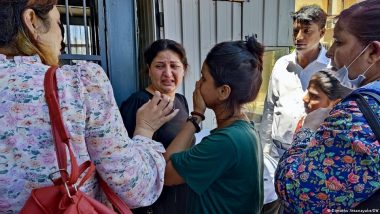With the UN's refugee agency bureau on the verge of closing, those in limbo fear their already grave situation is about to get worse.It has been over a decade since Fareedun Riffat fled her hometown Karachi, Pakistan, with her family. She arrived in Sri Lanka seeking asylum after her inter-caste marriage put the family at risk.
Also Read | Nepal Occupies Special Place in India's 'Neighbourhood First' Policy, Says Foreign Secretary Vinay Kwatra.
Riffat's family received refugee status from the UN Refugee Agency (UNHCR) as far back as 2015, but delays in application processing and rejection from host countries have kept them in Sri Lanka — a temporary destination until repatriated elsewhere.
Also Read | What is the Iran-Taliban Water Conflict All About?.
But now, the imminent ending of the UNHCR operations in Sri Lanka has led the family to fear that they will be forever trapped in transit.
Since Sri Lanka is not party to the Geneva Convention relating to the Status of Refugees, agreed in 1951, refugees have no right to legally work while in the country, and can even be deported if caught working illegally.
While in Sri Lanka, asylum-seekers and refugees have access to the public health system, and once recognized as a refugee, UNHCR provides a monthly living allowance. As part of the allowance, children also receive funding for school education.
Recent data shows that only 21% of the UNHCR's 2023 financial requirements for Sri Lanka have been met so far.
By November 2020, there were 1,253 refugees and asylum-seekers in the country, and in December 2022, the Sri Lankan Navy rescued a boat carrying 105 displaced Rohingya people from Rakhine state in Myanmar, who are currently residing in Sri Lanka.
Stateless?
But now, after receiving verbal communication from UNHCR regarding the closure of the Sri Lanka office within the next two years, some of the refugees and asylum-seekers are apprehensive amidst the uncertainty.
Riffat's family, whose request for resettlement has already been rejected by two countries, is now anxious that they may have to return to Pakistan.
"In 2019, UNHCR told us to go back to Pakistan. But, if we go back, we will be killed," she told DW.
But, staying in Sri Lanka would also be challenging without UNHCR support, as come December the financial aid will dry up. This includes funding for school fees received by Riffat's daughters, and other refugee children, which may disrupt their education.
"We were informed [by UNHCR that there will be] no allowance after December. And no scholarship for school," Riffat said.
For the asylum-seekers who have not yet received refugee status from UNHCR, Riffat's fears are already an everyday reality.
Jennifer Ifra is another person who is living out that reality. Persecuted for being a part of a Christian minority community in Pakistan, Ifra escaped her country with her family seven years ago, to arrive in Sri Lanka.
But they still haven't received refugee status. This means there is no living allowance for the family, or funding for her five-year-old daughter to attend school. Ifra says that the family have sold their belongings to afford daily necessities.
"We live here like beggars," she said. "We want justice from UNHCR. We want our resettlement fast."
Last week, Riffat, Ifra and some other refugees and asylum-seekers protested in front of the UNHCR office in Colombo, demanding that their applications be processed soon, and that their resettlement be finalized. An officer listened to their grievances across the gate and accepted a petition on behalf of the UNHCR.
'Traumatized'
These long delays in application processing and uncertainty on resettlement can shatter the mental health and dignity of refugees and asylum-seekers, Ruki Fernando, a refugee rights activist from Sri Lanka, told DW.
"They are already very traumatized [by the time they arrive in Sri Lanka] because of the kind of persecutions they had to undergo," he says.
Some of them have experienced "a lot of physical violence," some have been shot at, he notes, adding that the delays in getting a decision about their final destination only intensifies the existing trauma.
"I think [having to live this way is an] affront to their dignity as human beings. It is an affront to [their] skills, talents, knowledge and professional qualifications," Fernando says.
Lives slipping away
As they wait years in Sri Lanka hoping to be resettled in other countries, many of the refugees and asylum-seekers feel that their lives are steadily slipping away.
For instance, a member of the persecuted Rohingya community in Myanmar, who wishes to be known as Mohammad, escaped to Bangladesh in 2013 to avoid being arrested by the Myanmar military regime, and later arrived in Sri Lanka in January 2015, awaiting permanent resettlement in a third country.
When Mohammad fled Myanmar, he was still a second-year zoology student at university, and had hopes of continuing his education.
He once dreamed of being a teacher, but some seven years after landing in Sri Lanka, and now in his early 30s, he feels trapped without being able to do any kind of work.
"I could not [finish] my education yet, I could not get my degree," he said.
Mohammad hopes UNHCR will process his application for resettlement before the Colombo office closes down. "I have [told] UNHCR that we cannot work in Sri Lanka or make life here," he says.
In an email response to DW's query on facilitating resettlement for the refugees and asylum-seekers in Sri Lanka, Babar Baloch, regional UNHCR spokesperson for Asia and the Pacific, said: "UNHCR is aware of refugee concerns and continues to engage to address these issues."
"With the wide-scale displacement situation in Sri Lanka over and majority of internally displaced people returning to their places of origin, we are now able to review our presence in the country," the emailed response said.
But for many refugees remaining in Sri Lanka, hope is receding.
Sumaira Faisal, a Christian refugee from Pakistan, waiting in Sri Lanka for more than seven years, is alarmed at the UNHCR office closing down. "What will happen to us? Who will accept us?" she asks, fearing the departure of the UNHCR will signal an end to the chances of fulfilling her wish to remain permanently in Sri Lanka.
Edited by: John Silk
(The above story first appeared on LatestLY on Jun 01, 2023 09:20 PM IST. For more news and updates on politics, world, sports, entertainment and lifestyle, log on to our website latestly.com).













 Quickly
Quickly


